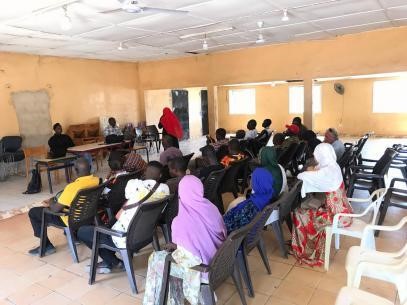By Madi S. Njie
In a drive to present a comprehensive review of its progress towards achieving the Sustainable Development Goals (SDGs) while fostering partnerships and strengthening its institutional capacity for sustainable development, the Ministry of Finance recently organised a day’s sensitisation seminar for disabled people’s organisations under the purview of the Gambia Federation of the Disabled (GFD).
The event is also part of efforts to mainstream disability in The Gambia, in line with the National Disability Act, which among others, requires inclusion and participation of persons with disabilities in all spheres of development.
However, during these discussions, persons with disabilities observed that their conditions have not improved but have deteriorated. Hence, they call for more recognition and improved conditions for persons with disabilities (PWDs).
Participants at the seminar, which was held at the GOVI Resource centre in Kanifing, noted that addressing the health needs of PWDs is a major concern. They said having sign language interpreters is a major obstacle that prevents deaf and hard of hearing persons from accessing quality health services. This situation, among others, has led to wrong diagnoses, which can lead to health complications and conditions that may lead to death.
PWDs called for specialised health care providers and hospitals.
Section 28 of the PWD Act and Article 25 of the UN Convention on the Rights of Persons with disabilities highlight the health care needs of all PWDs.
Therefore, they call on the Government to provide subvention for PWDs, as well as break the inequality gap between PWDs and their counterparts.
Participants also lamented the difficulty PWDs face in politics because of their condition.
Mr. Kebbah Jallow, the Principal Planner at the Finance Ministry, explained that The Gambia has received approval from the United Nations Economic and Social Council (ECOSOC) to submit a Voluntary National Review (VNR) on the Sustainable Development Goals (SDGs) in 2025, marking the country’s third VNR which will be presented at the High-Level Political Forum (HLPF) in July 2025 in New York.
“The VNR serves as a progress report to share The Gambia’s achievements, challenges and lessons learned in the implementation of the 2030 Agenda for Sustainable Development,” he said.
Mr Jallow said 366 VNRs have been conducted globally at the HLPF and that a total of 191 countries have presented VNRs, with 138 having conducted more than one. He said seven countries have yet to present a VNR, while 53 countries have presented one VNR; 107 countries have presented two; 25 countries have presented three; and six countries have presented four.
On The Gambia’s Status:
The Gambia is among the 39 countries scheduled to present their VNRs at the United Nations High-level Political Forum (HLPF) in July 2025. This will be The Gambia’s third VNR, highlighting its continued commitment to the SDGs. The objective of The Gambia’s VNR is to facilitate the sharing of experiences, including successes, challenges and lessons learned, and to accelerate SDG implementation; provide a platform for partnerships by engaging major groups and stakeholders; strengthen government policies and institutions while mobilising multi-stakeholder support for SDG implementation; and identify key stakeholders whose expertise can be leveraged to fast-track SDG attainment.
Methodology for the VNR Process:
The Gambia’s approach involves inclusive and participatory consultations at multiple levels, such as the National Stakeholder Fora, and to engage in consultations with Ministries, Departments and Agencies, Civil Society and non-governmental actors by ensuring alignment with national policies.
He said the consultation objectives aim to sensitise stakeholders about the SDGs, update participants on The Gambia’s progress in implementing the SDGs, gather stakeholder perceptions on SDG progress and challenges, and enhance inclusivity and participation in the VNR process.
On Institutional Framework for Coordination:
To oversee and manage the VNR process effectively, The Gambia has established several committees, namely the National Steering Committee led by the Secretary-General and Head of Civil Service to oversee the overall coordination of the process. This includes representatives from government, UN Agencies, academia, the private sector, civil society organisations (CSOs), and youth groups.
The Core Technical Committee supports the National Steering Committee by managing the day-to-day operations of the VNR process.
The Data and Information Committee is responsible for collecting and collating data related to SDG implementation. The
Outreach and Communication Committee- Manages outreach efforts and communication strategies for the VNR process.
PWDs have called for more recognition, inclusion, and mainstreaming of PWDs in all spheres of national development. They noted that achievements have been recorded to some extent at the organisational level, where women are being empowered and given opportunities to hold leadership positions, but said such trends need to be reflected at the parliamentary level.
Other senior planners of the Ministry of Finance, including Mr. Ansumana Saidykhan and Mrs Awa Jobe-Drammeh attended the seminar.


















